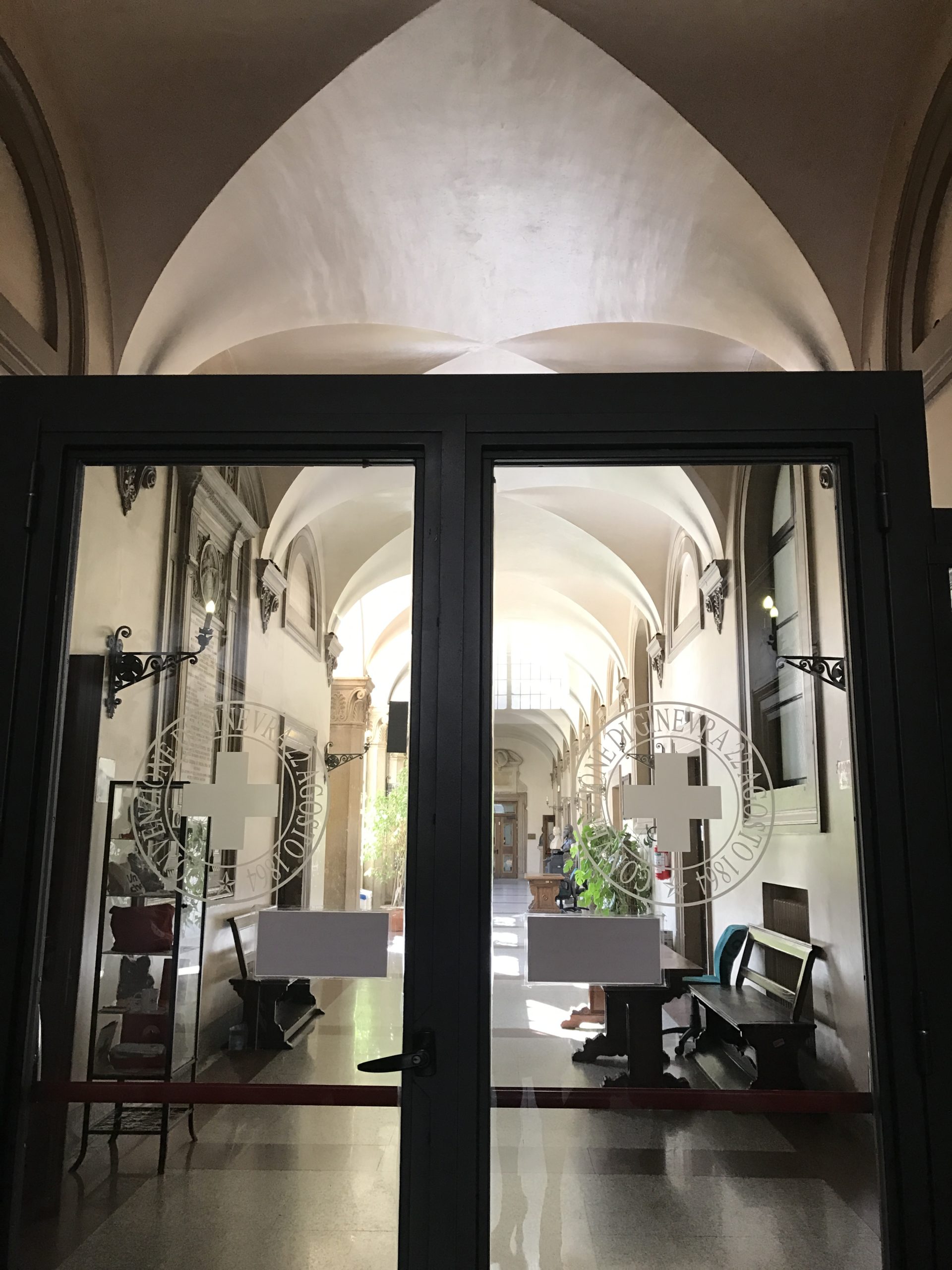Italy Rome (1)
>> Hello. [FOREIGN LANGUAGE]
>> Wow.
[FOREIGN LANGUAGE]
>> Tell him ... Ask him, Korea War broke out after World War II, very shortly after.
[FOREIGN LANGUAGE]
>> So ...
[FOREIGN LANGUAGE]
>> So, he must ...
[FOREIGN LANGUAGE]
>> He must have been tired of war, seeing war, so why did he volunteer to go to Korea?
>> Okay.
[FOREIGN LANGUAGE]
>> Thank you very much, yes.
[FOREIGN LANGUAGE]
>> What is that?
[FOREIGN LANGUAGE]
>> The Land of the Morning Calm.
>> Of the Morning Calm, okay.
[FOREIGN LANGUAGE]
>> Samsung, IKEA.
[FOREIGN LANGUAGE]
>> There were Italian ...
[FOREIGN LANGUAGE]
>> Ask him if he ... Has he ever seen pictures of modern Korea?
>> Okay.
[FOREIGN LANGUAGE]
>> No.
[FOREIGN LANGUAGE]
>> Tell him, when he came back ...
[FOREIGN LANGUAGE]
[ Chatter ]
>> ... because there were so few nurses and doctors ...
>> Mm-hmm.
>> ... remember how many there were, very few? That when he came back ...
[FOREIGN LANGUAGE]
>> ... did they keep in touch?
>> Okay.
[FOREIGN LANGUAGE]
>> No.
>> No?
>> No.
>> No.
[FOREIGN LANGUAGE]
>> What kind of patients did he treat in Korea?
>> Okay.
[FOREIGN LANGUAGE]
>> Like women, children, old ...
[FOREIGN LANGUAGE]
>> Soldiers?
[FOREIGN LANGUAGE]
>> Ethiopia.
[FOREIGN LANGUAGE]
>> Did he ... Does he know about other medical units from Sweden, Norway?
>> Okay.
>> Denmark?
[FOREIGN LANGUAGE]
>> NORMASH, NORMASH.
[FOREIGN LANGUAGE]
>> Denmark.
[FOREIGN LANGUAGE]
>> Only Italian doctors in his unit.
>> No, I know. I know, but did he know about the other doctors?
[FOREIGN LANGUAGE]
>> Did they ever meet him?
[FOREIGN LANGUAGE]
>> Had he ever met them because ... Tell him because when I went to Sweden and Norway, they said that they went to each other's places like the Norwegian doctor went to the Swedish hospital to visit.
>> Mm-hmm.
>> So has he ever visited other hospitals?
>> Okay.
[FOREIGN LANGUAGE]
>> Just Sweden.
>> Sweden.
[FOREIGN LANGUAGE]
>> Can you tell him to tell us maybe a story that he remembers like a touching story, a moving story about a patient ...
>> Okay. Okay.
>> from the hospital, not necessarily personal, but just from the hospital.
[FOREIGN LANGUAGE]
>> In a gist, what did he say in a gist?
>> In a gist?
>> In a gist.
>> What is an a gist?
>> Gist, like the gist of what he said.
>> Oh.
>> Summarize briefly what he said.
>> So he basically described the hospital and the patient. He mentions the sicknesses that existed like it was lepers.
>> Leprosy.
>> Leprosy, and he also ... Yeah. He mentions leprosy.
>> [INAUDIBLE].
[FOREIGN LANGUAGE]
>> Yeah.
[FOREIGN LANGUAGE]
>> Wasn't it in mice or something? Or ...
>> No, it's in the Bible something. It's ... Now what did he do when he came back. How was his life after he came back from Korea?
>> Should I ask him that.
>> Yes.
>> Okay.
[FOREIGN LANGUAGE]
>> Normal, like it was before.
[FOREIGN LANGUAGE]
>> Ask him what ... he must ... Is he proud of his contribution, his service?
[FOREIGN LANGUAGE]
>> What did he say?
>> So yes, he is proud of fighting for Korea because ...
[FOREIGN LANGUAGE]
>> Yeah.
[FOREIGN LANGUAGE]
>> Yeah.
[FOREIGN LANGUAGE]
>> When did he get married?
>> Okay.
[FOREIGN LANGUAGE]
>> How did he meet her?
[FOREIGN LANGUAGE]
>> Oh, they knew each other when they were young.
>> Yeah. He said that she was older than he was by 6 years.
>> Oh, wow. How did they meet?
>> They met in Turin. That's all he said.
>> Ooh, la, la.
>> Ooh, la, la.
[FOREIGN LANGUAGE]
>> Mm-hmm, so he basically has a total of seven kids, two girls and two boys in second marriage, and the one boy died in his first marriage, and I believe in the first marriage there was another boy.
>> Oh, wow.
[FOREIGN LANGUAGE]
>> So he ...
[FOREIGN LANGUAGE]
>> So he basically ... He returned back home poor just like ...
>> Just like he was before.
>> Just like he was before, and he's very interested in history, so rather than getting whatever, $10 million or whatever, and he also said ... Yeah. That's what he said.
>> Ask him finally if there's any pictures that he wants to show us.
[FOREIGN LANGUAGE]
>> Any special one, special, special?
[FOREIGN LANGUAGE]
>> Ask him when his birthday is.
[FOREIGN LANGUAGE]
>> Oh, the 20th of August.
[FOREIGN LANGUAGE]
>> What year?
>> Oh, 1924.
[FOREIGN LANGUAGE]
>> And then when was it, his birthday?
>> August 20th, 1925.
[FOREIGN LANGUAGE]
>> You? Really. No guitar, piano.
[FOREIGN LANGUAGE]
>> You have harmonica? You have? Can you play for us?
[FOREIGN LANGUAGE]
>> Wow. Wow.
[FOREIGN LANGUAGE]
>> What did he say?
>> This is ... he's ... This is yours.
>> Ooh. Mine?
[FOREIGN LANGUAGE]
>> I'm checking.
[FOREIGN LANGUAGE]
>> I don't know if he wants you to take it or what or I don't know if he meant that.
>> I don't think so.
>> I don't think so. I wouldn't do it because saying take it could also be just to look at ..
>> Yeah. Yeah. Yeah.
>> So yeah, so ...
>> Okay. Let's go.
[FOREIGN LANGUAGE]
>> Okay, concert.
[FOREIGN LANGUAGE]
>> Very good, grazie.
>> Grazie mille.
>> Grazie, grazie.
[FOREIGN LANGUAGE]
